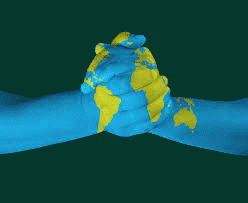It is not so far-fetched to imagine Walter Benjamin's Angel of History succumbing to the temptation, and stressing that the time of the Global South has finally come.
Call it the post-modern, digital follow-up to Frantz Fanon's classic The Wretched of the Earth.
This is an absolutely essential book to be read alongside another delight written by a global Asian, Pankaj Mishra's From the Ruins of Empire: The Revolt Against the West and the Remaking of Asia, which uses key figures such as Jamal al-Din al-Afghani, Liang Qichao and Rabindranath Tagore to tell an extraordinary story.
Prashad, director of international studies at Trinity College, Connecticut, and author of the splendid The Darker Nations, which should be read as a preamble to this book, sets the scene right from the start -- using the requisite Fanon quote; by 1961, what was configured was a fight between the Third World Project ("for peace, for bread and for justice") and the Atlantic Project. Key actors: the Non-Aligned Movement (NAM), the de facto secretariat of the Third World Project, and the Group of 77 developing nations, created in 1964 to act on behalf of NAM in the United Nations.
The founders of the NAM enjoyed iconic status in the post-colonial world; Jawaharlal Nehru in India, Gamal Abdel Nasser in Egypt, Sukarno in Indonesia, Josip Broz Tito in Yugoslavia. Yet they knew this was an uphill battle. As Prashad notes, "the UN had been hijacked by the five permanent members of the Security Council. The IMF [International Monetary Fund] and the World Bank had been captured by the Atlantic powers, and the GATT [General Agreement on Tariffs and Trade, precursor to the World Trade Organization] was designed to undermine any attempt by the new nations to revise the international economic order."
As for the Atlantic Project, a 1969 quote from Henry Kissinger -- co-destructor of Cambodia, Pinochet enabler, disgusted Saudi ally (the "most feckless and gutless of the Arabs") and praiser-in-chief of the Iranian Shah ("a tough, mean guy") -- would suffice: "Nothing important can come from the South. The axis of history starts in Moscow, goes to Bonn, crosses over to Washington, and then goes to Tokyo. What happens in the South is of no importance."
Atlanticists were fiercely against the "no importance" Third World Project, but also against social democracy and communism. Their Holy Grail was to wallow in easy profits provided by a new global geography of production, "technological shifts that enabled firms to take advantage of differential wage rates" -- most of all, those very low wages paid all across East Asia.
So the stage was set for the emergence of neoliberalism. Here Prashad moves in parallel with the indispensable David Harvey, detailing how the Global South became ripe to be fully (re)exploited; bye bye national liberation ideas of collective good.
Keep the barbarians out
With the IMF currently part of the troika dictating austerity to most of Western Europe (alongside the European Commission and the European Central Bank), it's easy to forget that in 1944 things were already pretty warped. The developing world had no say whatsoever in Bretton Woods, not to mention any sort of control over the UN's five-member Security Council. It was the silence of the lambs; the wolves prevailed, and inequality was set in stone.
Prashad proceeds with the indispensable details of how the US dollar became the effective world currency, with the US swinging the price of the dollar globally, regardless of any consequences; the formation of the Group of Seven as essentially an anti-developing world mechanism (and not anti-Soviet); and of course the much-dreaded Trilateral Commission, set up by Chase Manhattan's David Rockefeller to impose the will of the North against the South.
And guess who was the Trilateral's intellectual architect? The ineffable Zbigniew Brzezinski, later president Jimmy Carter's consigliere. Dr. Zbig wanted to "contain the contagious threat of global anarchy." Divide and rule, once again; the periphery needed to be put in its place.
By the way, one should always remember that in his 1997 epic The Grand Chessboard, Dr. Zbig, who became the foreign policy adviser to Barack Obama in 2008, wrote, "The three grand imperatives of imperial geo-strategy are to prevent collusion and maintain security dependence among the vassals, to keep tributaries pliant and protected, and to keep the barbarians from coming together." For a long while the "vassals" were easily contained; but Dr. Zbig, one step ahead of Kissinger, was already planning how to contain the two key "barbarians," ascending Eurasian powers Russia and China.
The Group of Seven anyway was a roaring success, pushing its "theory of governance" everywhere, implemented by -- who else -- the Bretton Woods mafia. Prashad neatly defines it: "What went by the name of neoliberalism was less a coherent economic doctrine than a fairly straightforward campaign by the propertied classes to maintain or restore their position of dominance," via the David Harvey-coined "accumulation by dispossession," now also known by millions of Europeans under the codename "austerity."
The numbers tell the story. In 1981, the net flow of capital to the Third World was $35.2 billion. In 1987, $30.7 billion left the Third World for Western banks. Praise the Lord and his law set in stone, also known as Structural Adjustment, based on "conditionality" (savage privatization, deregulation, destruction of social services, financial "liberalization").
Paraphrasing Dylan, when you got nothing, you still got this nothing to lose. There was never any political strategy by the North to deal with the debt crisis of the 1980s. The Global South lambs were only allowed in a sorry procession to receive their structural adjustment consecrated host one by one.
(Note: You can view every article as one long page if you sign up as an Advocate Member, or higher).






